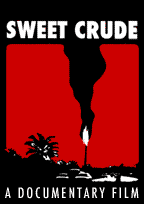Some staggering statistics
Quick Links
Many thanks to Marisa Peña, Sweet Crude researcher, for the untold hours she spent finding and synthesizing this data.
Life Cycle
- 1 in 5 Nigerian children dies before the age of 5.
- Many of them die from preventable diseases.
- 38% of kids under 5 are chronically malnourished.
- 70% of Nigerians live on less than $1 a day.
- Life expectancy in Nigeria is 44 years.
- Medical attention for most villagers is hours away by boat.
- More than 15 million Nigerian children work.
- 36% of Nigerian kids enrolled in grade 1 reach grade 5.
- Nearly all schools in the Niger Delta are in extreme disrepair.
- Niger Delta unemployment is 40% for ages 15-24 and 70-90% for adults.
Environment
- More than 6,000 oil spills have been recorded since 1976.
- Less than 25% of spills are remediated.
- Many Niger Delta residents suffer from oil poisoning.
- More gas is flared in Nigeria than anywhere else in the world.
- Over 250 toxins have been identified in gas flare emissions.
- Breathing particulate from flaring is linked to disease and premature death.
- Potable water in the Niger Delta creeks region is virtually nonexistent due to oil contamination.
- Oil pollution has killed off fish, fouled the soil and caused wildlife to vanish.
- Handmade fishing nets can become useless in 6 months from acid rain caused by flaring.
- Acid rain acidifies bodies of water, damages vegetation and decays building materials.
Marginalization
- 130 million people live in Nigeria, 20-30 million in the Niger Delta.
- 9 out of 36 states are in the Delta but the region is politically marginalized.
- Oil revenue from the Delta is 80% of the federal budget.
- The government and oil companies split the oil money 60-40.
- The oil companies operate in joint ventures with the Nigerian government.
- The 1969 Petroleum Act transferred all energy earnings to the federal government.
- The 1978 Land Use Act assigned all oil-bearing land ownership to state governments.
- Less than 20% of the Delta region is accessible by good roads.
- Less than 20% of Delta communities are connected to the national electrical grid.
Money Trail
- Nigeria’s corruption score is 2.2 out of 10 one of the worst rankings in the world.
- Oil revenues since the 1970s are estimated at US$300 billion.
- 80% of oil and gas revenues accrue to just 1% of the population.
- By law, 13% of the oil money should go to producing localities; it doesn’t get there.
- Niger Delta state governors are said to divert most of these funds for personal use.
- Local government chairs are paid by the federal government, with no local accountability.
- The Niger Delta Development Commission claims to receive a fraction of its allotted funding from the federal government.
- Audits show a huge gap between what oil companies say they paid and what the government says it received.
Militancy
- There are said to be 20 fortified militia camps in the Niger Delta.
- An estimated 12-15 armed militant groups operate in the Delta.
- The number of illicit weapons is thought to be about 70,000.
- About 15,000 Nigerian Joint Task Force troops are deployed in the Niger Delta creeks region.
- The Nigerian military has razed communities and killed thousands of civilians with impunity.
- Between January 2006 and May 2007, more than 200 hostages were taken by militants.
- Surges in global oil prices have been linked to announcements by the militancy.
- In January 2006, increased tension pushed oil prices to $68/barrel.
- In February 2006, oil prices rose sharply in response to a series of kidnappings by MEND.
- In April 2006, oil prices spiked toward $70/barrel after MEND issued a threat of renewed attacks.
© 2007 Sweet Crude Movie LLC. All rights reserved.
Website designed by Xolara LLC




